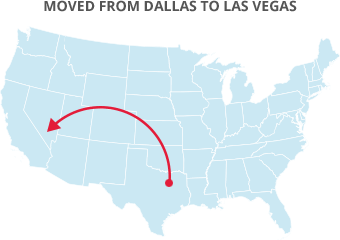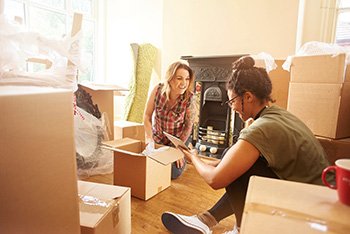

 There's something about a tall pile of boxes and rolls of packing tape that is invigorating—here's your opportunity to sort through all your possessions and meticulously box your prized possessions, so when you get to your new home and begin unpacking the boxes it will feel just like your birthday when you were a kiddo. Pretend for a few seconds that is how the whole scenario actually unfolds, and you're not rushing through the home like a loon throwing heirloom crystal in with the bowling balls, be sure you have the right packing supplies for your moving project.
There's something about a tall pile of boxes and rolls of packing tape that is invigorating—here's your opportunity to sort through all your possessions and meticulously box your prized possessions, so when you get to your new home and begin unpacking the boxes it will feel just like your birthday when you were a kiddo. Pretend for a few seconds that is how the whole scenario actually unfolds, and you're not rushing through the home like a loon throwing heirloom crystal in with the bowling balls, be sure you have the right packing supplies for your moving project.
Boxes and tape are some of the most important supplies for packing, but all boxes and tape are NOT created equal. It's acceptable to throw random coffee mugs in an old toaster box and store it on the top shelf of the pantry, but to pack, stack, and transport that box, it will breakdown like a house of cards and you will wind up with a lot of broken mugs.
If you are packing packing your own stuff, conduct some research into the materials before you get started. If you are hiring a moving company to execute the actual moving, they will most likely have the right heavy-duty boxes, tape, and wrapping stuff you will need. If not, storage facilities, big box stores, and the internet are decent sources to get your supplies, but since you cannot do tactile research online, don't count on reviews to help you make up your mind—everyone packs differently and "sturdy" and "solid" are highly subjective terms.
Look for boxes that are corrugated--a layer of wavy fiber between the inner and outer layers of heavy cardboard. The corrugation gives the box structure and stability, so when you stack them on the truck they do not cave in. There are varying grades of toughness within the corrugated department, so you may purchase the box strength you require for a specific item--go with the strongest duty boxes for the most fragile and the bulkiest things you'll pack.
While you're purchasing boxes, load up on the small ones--heavy things go in small boxes, bulky lighter items go in the bigger boxes. For example, books weigh quite a bit and should be put in a small box. Blankets and throw pillows are comparatively light and can be placed in the bigger ones.
Purchasing bargain, low quality tape is where many DIY packers get stymied. If it's low-quality, it will not adhere well. Worse, it will stick to itself when it is dispensed out of the gun and splinter in small little pieces and then you have to pick off the needle end and try to get it to unstick in a single piece. Be extravagant and purchase a good-quality gun or two with a padded handle—you'll be glad you did when you're sixty boxes in with a lot more to pack. It is also a good idea to get your tape in bulk--it costs less and you can usually take back what you do not use.
 There are a few alternatives for padding inside the boxes. Old towels and sheets are amazing when you need something lining the box, like when you're packing shoes and don't want them banging around.
There are a few alternatives for padding inside the boxes. Old towels and sheets are amazing when you need something lining the box, like when you're packing shoes and don't want them banging around.
Newsprint is definitely the best option for nearly everything--from packing mugs (thread a twisted end through the handle and stuff the other ends inside once it's wrapped) to books to small appliances.
Bubble wrap can get expensive, but get the good stuff anyway, since that is what you'll use it for. The bubble size fluctuates, but a fair guideline is for your bubble size to pair the item size—save the big bubbles for lining around the entire box. Feel the wrap before you purchase it, and make sure of how strong it is when you push and pull it. If it's weak or does not like the bubbles hold, try a different brand.
If you haven't moved for a while, and you go looking for boxes, prepare to be surprised at the alternatives you have. When your parents moved, they probably bought their tape and boxes and had the whole neighborhood saving newspapers for a long time. Currently, there are bunches of specialty moving supplies you'll discover on the shelves—some are really worth the extra expense, some are just reinventing the wheel—it's up to you to figure out what is going to be best for you situation. Just remember, make positive you're purchasing acceptable quality--you don't want your mattresses in flimsy plastic sheeting.
Now that you've got the smaller items under control, focus on how you're going to move the bulky items out the door--the dressers, the lawn mower, the grill--but don't fear, help is right around the corner. For moving some of these things renting equipment is the best course of action.
Your furniture is more fragile than you think--surface dings and scrapes are entirely too common when things come off the truck. You can avoid these issues with some basic protection; again, make sure you're obtaining decent quality materials that stand up to the rigors of moving.
The last supplies you'll require are for the big time heavy and bulky stuff. Unless you have these already, it would be best.
No matter how you're moving your household, your local moving company will be able to help you with all of the speciality items you'll need to move. Just keep in mind that you're packing your whole life in these boxes, so take care that your moving supplies are acceptable to handle the task.

